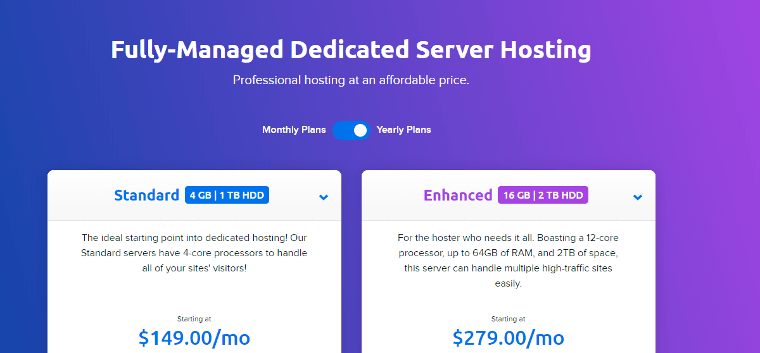Web hosting is a type of Internet service that provides a server and its supporting facilities that allow you to publish your website on the Internet so that it can be accessed from all over the world for 24 hours.
In general, there are currently 6 popular types of web hosting, namely:
- Shared Hosting
- WordPress Hosting
- VPS Hosting
- Dedicated Hosting
- Cloud Hosting
- Reseller Hosting
How to choose the right type of web hosting for your website?
Don’t worry, after reading this article you will definitely know what are the differences between the various types of web hosting above and can determine which type of web hosting is right for you.
Shared Hosting

Shared hosting is the most widely used hosting type by websites in the world. Why? Because the cost is the cheapest compared to other types of hosting.
The question is why can it be cheaper?
The answer is simple, namely because the server costs are borne by many customers. In shared hosting, servers are used by multiple customers by sharing server resources, which include CPU, memory and storage.
Shared hosting can be likened to a boarding house, where one house is divided into several rooms. Each occupant of the boarding house will use the facilities provided by the boarding house together, for example bathrooms, electricity, water and so on.
If all the occupants of the boarding house behave well, there will be no problems in the boarding house. However, if someone goes beyond the limits, for example being greedy in using water or electricity, the other occupants of the boarding house will be disturbed.
This also applies to shared hosting. If there is a bad customer, for example using excessive server resources then other customers using the same server will be disturbed. This is the main drawback of shared hosting.
But recently there has been a commercial operating system called CloudLinux that allows limiting server resources for each customer. Each customer will be limited to the maximum allowable CPU and memory consumption. When it reaches a certain limit, the customer’s website will not be accessible, while other customers remain safe and are not affected at all.
VPS Hosting

Virtual Private Server or VPS is a higher level hosting type compared to shared hosting.
VPS uses software that allows sharing of resources into virtual machines on servers. Each virtual server will have an operating system that runs independently. VPS also provides full access to the root user.
VPS is usually used on websites or applications that require resources on top of shared hosting. If you have a website or application that requires high enough resources with a minimal budget, you can use a VPS service.
If you buy VPS, it’s as if you have your own server. You can set what operating system to use, web server settings, software that needs to be installed, and so on.
VPS can be likened to an apartment where every occupant of the apartment has the freedom to manage the contents of the apartment they occupy, the furniture to be used and so on. Each apartment dweller seems to have their own home when in reality they only live in a room of a large house.
Dedicated Hosting

If you buy dedicated hosting, you will use a physical server yourself so you can install the operating system and control panel and make full arrangements for the server.
Dedicated hosting can be likened to a rental house occupied by only one family where the family is free to paint the house in any color, free to add any facilities, free to receive guests at any time and other freedoms just like living in their own house.
Dedicated hosting is usually used for large-scale websites or applications with high traffic and requires large resources. Users can choose the desired server specifications themselves. Furthermore, the server will be placed in a data center. The reason it is placed in a data center is because the server must be protected from flooding, earthquake resistant, and requires special temperature circulation for the server.
Cloud Hosting

Cloud server is almost similar to VPS where there is virtualization in it. The difference is, if on a VPS the virtualization aims to divide a server into several virtual servers, then on a cloud server this virtualization aims to combine many servers into one giant server that has enormous resources.
The cloud server is then used as appropriate. It can be used alone, for example by large companies that need large computing resources (for example for processing big data and Apple’s iCloud system where iPhone, iPad and MacBook users can upload unlimited data to the “cloud”), or used in groups such as as well as shared hosting and VPS.
From there, the terms Cloud VPS and Cloud Hosting emerged.
Cloud VPS is a virtualization system that runs on top of a virtualization system. The cloud server resources were broken up into smaller virtual pieces. The difference is that with a regular VPS, in this Cloud VPS the server resources used are virtual resources that are spread over many servers.
If a server in the cloud system experiences a failure/error, the other server will immediately handle it without any delay. Whereas on an ordinary VPS, when the server has an error, all VPS on that server can be affected.
Whereas Cloud Hosting has the same principle as shared hosting, it’s just that it runs on a cloud server.
WordPress Hosting

As the name implies, this type of web hosting only provides hosting services for WordPress-based websites. So, if you want to create a website with WordPress, you should consider this type of hosting.
Since the service is specific to WordPress, this type of web hosting has been optimized in such a way that your website can run optimally with a high level of security.
Another advantage is that you don’t have to bother with installation problems, WordPress updates to data backups because everything is handled automatically by the WordPress hosting service provider.
Reseller Hosting

Do you know what reseller means? As the name implies, Reseller Hosting is a type of web hosting where later the service will be resold to other people.
By knowing what it means, of course you can already guess that only certain people need web hosting with the Reseller Hosting type.
If you just want to create a website for yourself, Reseller Hosting is definitely not the type of web hosting for you.
However, if you are a web designer and are frequently asked to create websites for your clients, then Reseller Hosting is worth considering.
You can offer a website design package complete with web hosting services to your clients so they no longer need to buy web hosting services from other companies.
With Reseller Hosting, your clients also get the same facility to manage their own web hosting. The difference is that the client pays for web hosting to you, not to the web hosting service provider that you use.
So here you act as a reseller, which means you will benefit from the difference between the fees you pay to your web hosting service provider and the fees you charge your clients.
Conclusion
There are various types of web hosting. In fact, there are not only 6 types of web hosting as discussed above. But currently, in general, only 6 types of web hosting are popular.


